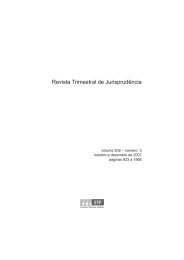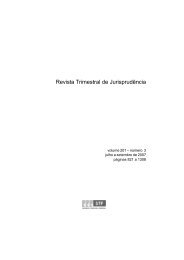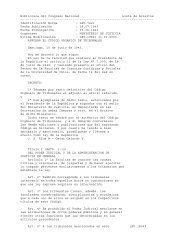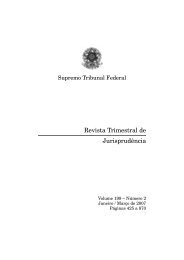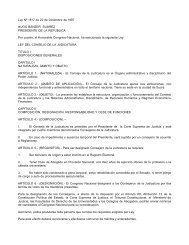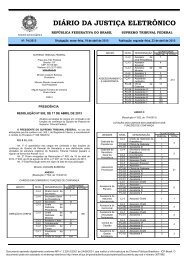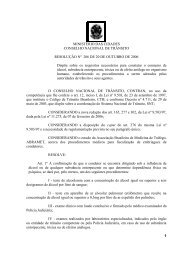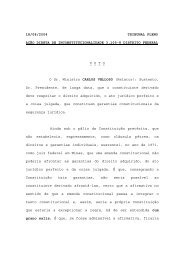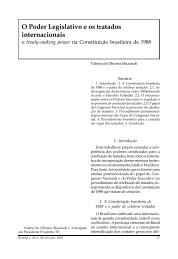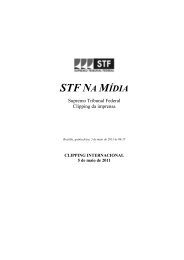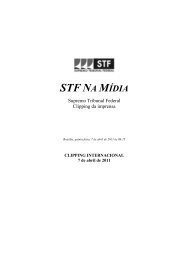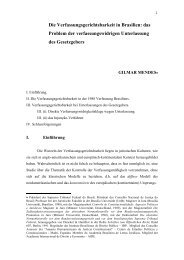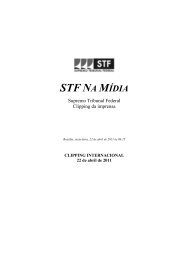STF NA MÍDIA
STF NA MÍDIA
STF NA MÍDIA
You also want an ePaper? Increase the reach of your titles
YUMPU automatically turns print PDFs into web optimized ePapers that Google loves.
ent olive tree, known as al-<br />
Badawi. Thought to have<br />
stood for up to 5,000 years,<br />
the tree s knotted trunks and<br />
branches would serve well as<br />
an emblem of the incipient<br />
state of Palestine, whose demand<br />
for recognition at the<br />
United Nations next week is<br />
causing seismic waves in<br />
diplomatic and political circles.<br />
But for Walaja s 2,300-<br />
strong population, the perspective<br />
is different. Deeply<br />
disillusioned after 20 years of<br />
negotiations that have failed<br />
to produce independence,<br />
and through which Israel has<br />
relentlessly built and expanded<br />
settlements in the West<br />
Bank and East Jerusalem,<br />
many Palestinians have little<br />
faith in their political leaders<br />
to effect meaningful change.<br />
"We are suffering from a<br />
leadership crisis," says Ahmad<br />
Barghouth, 64, a neighbour<br />
of Atrash in Walaja.<br />
"Our leaders are either fools<br />
or traitors. Throughout history<br />
I don t think independence<br />
has been granted to a<br />
state with no land."<br />
Barghouth, whose terraces of<br />
fig, plum, walnut and olive<br />
trees are also being churned<br />
up to make way for the barrier<br />
a few metres from his house,<br />
is scathing about the suggestion<br />
that a positive UN<br />
vote may open up recourse<br />
for the Palestinians to international<br />
legal bodies.<br />
The international Court of<br />
Justice ruled in 2004 that the<br />
construction of the West<br />
Bank barrier was illegal and<br />
should be halted. "Did anyone<br />
implement it? You see the<br />
wall before your eyes," says<br />
Barghouth. The UN passed<br />
resolutions calling on Israel<br />
to end its occupation. "Have<br />
these been implemented?"<br />
asks Barghouth. "We want<br />
action on the ground, not<br />
votes at the UN. We want an<br />
end to it."<br />
Despite such scepticism, and<br />
fears that the move towards a<br />
Palestinian state could effectively<br />
relinquish the right of<br />
refugees to return to their<br />
original homes, Palestinian<br />
leaders insist their strategy is<br />
correct in the context of two<br />
decades of failed negotiations.<br />
They say a positive vote on<br />
the issue of statehood will<br />
strengthen the Palestinians<br />
hand in negotiations. Such an<br />
act of political symbolism,<br />
while not immediately altering<br />
conditions on the<br />
ground, could change the<br />
paradigm of relations between<br />
Israel and Palestine, they<br />
argue.<br />
According to the national<br />
campaign, Palestine: State<br />
194, the bid for membership<br />
of the UN is a step towards<br />
freedom and ending the occupation.<br />
"For almost seven<br />
decades now, the Palestinian<br />
people have been denied<br />
their natural and historical<br />
right to establish an independent<br />
state. The establishment<br />
of a sovereign and viable<br />
[state] is a debt owed by the<br />
international community to<br />
the Palestinian people that is<br />
long overdue," it says. "Now<br />
it is Palestine s time."<br />
Veteran Palestinian politician<br />
Hanan Ashwari told western<br />
diplomats this week: "September<br />
is a historic test for<br />
the international community.<br />
We have reached a turning<br />
point, both in terms of possibilities<br />
for peace on the<br />
ground and in the light of<br />
democratic changes transforming<br />
the region as a whole."<br />
Sheerin al-Araj, a member of<br />
Walaja s village council,<br />
concedes that the approach to<br />
the UN may be a useful tool<br />
to bring pressure to bear on<br />
Israel. "But it s not the end of<br />
the road," she says. "It has to<br />
serve a bigger goal … I don t<br />
trust [the Palestinian leadership]<br />
to have a back-up<br />
plan."<br />
One option she favours<br />
would be for the Palestinian<br />
Authority, created under the<br />
1993 Oslo accords, to "hand<br />
back the keys". She says:<br />
"We should say to them if<br />
you don t want us to have a<br />
state, take responsibility for<br />
your occupation."<br />
Negotiations, she says, are<br />
pointless. "You can t negotiate<br />
with someone who s holding<br />
you by the throat."<br />
Barghouth is also mistruST-<br />
Ful of a leadership which, he<br />
says, is doing Israel s dirty<br />
work. "The Palestinian security<br />
forces prevent any resistance<br />
while the settlers are<br />
carrying out atrocities against<br />
us, taking our trees, burning<br />
our mosques, humiliating our<br />
people. If we defend ourselves,<br />
Abu Mazen [Palestinian<br />
S T F N A M Í D I A • 2 2 d e s e t e m b r o d e 2 0 1 1 . . . . . . . . . . . . . . . . . . . P Á G I N A 4 6



